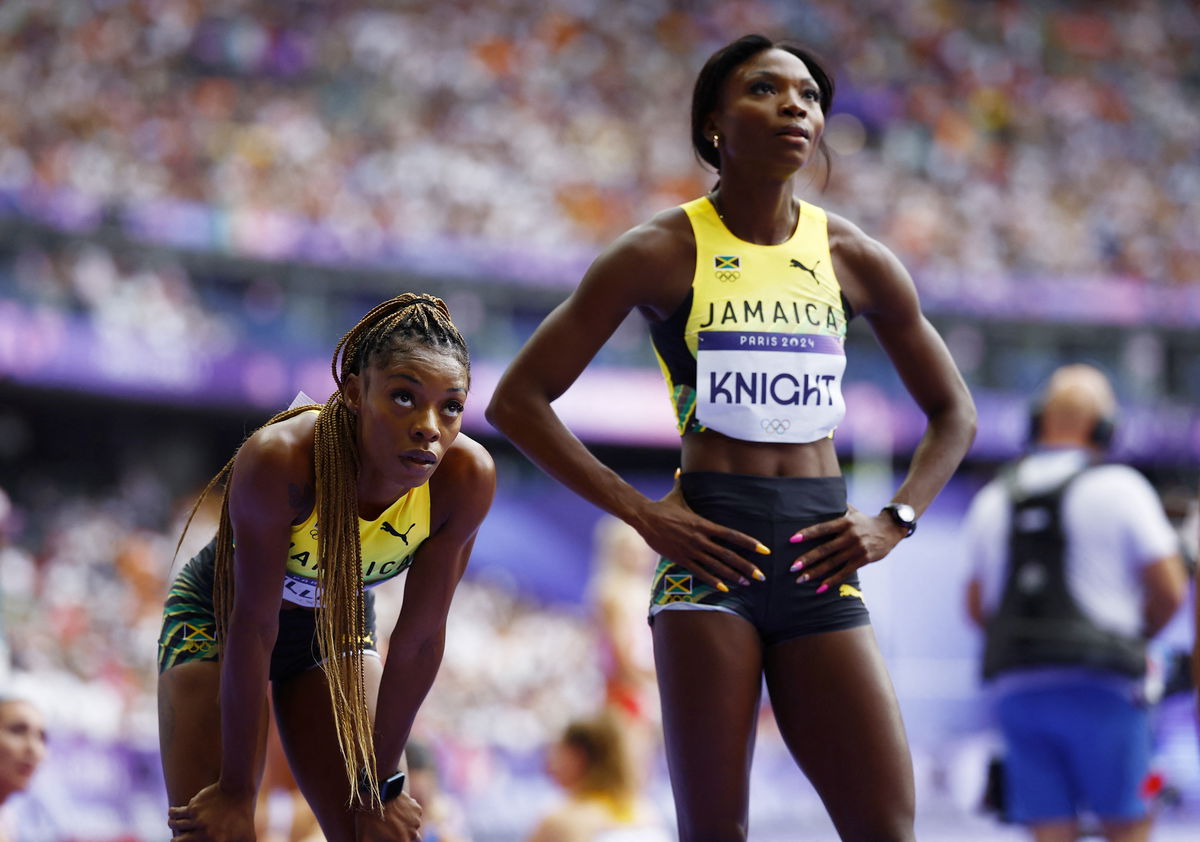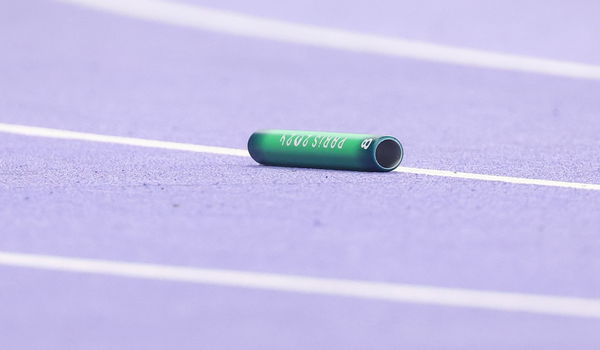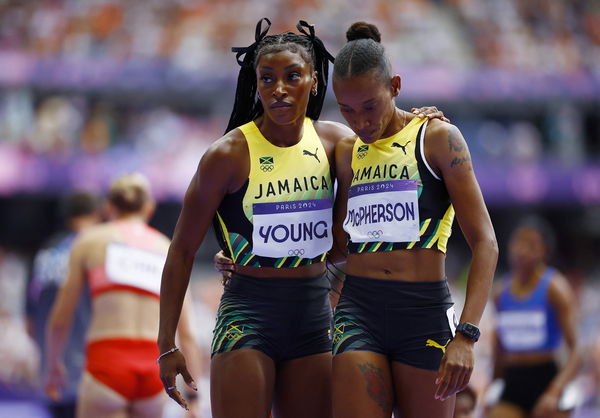
Reuters
Paris 2024 Olympics – Athletics – Women’s 4 x 400m Relay Round 1 – Stade de France, Saint-Denis, France – August 09, 2024. Andrenette Knight of Jamaica and Ashley Williams of Jamaica react after finishing in first place in heat 2. REUTERS/Sarah Meyssonnier

Reuters
Paris 2024 Olympics – Athletics – Women’s 4 x 400m Relay Round 1 – Stade de France, Saint-Denis, France – August 09, 2024. Andrenette Knight of Jamaica and Ashley Williams of Jamaica react after finishing in first place in heat 2. REUTERS/Sarah Meyssonnier

Reuters
Paris 2024 Olympics – Athletics – Women’s 4 x 400m Relay Round 1 – Stade de France, Saint-Denis, France – August 09, 2024. Andrenette Knight of Jamaica and Ashley Williams of Jamaica react after finishing in first place in heat 2. REUTERS/Sarah Meyssonnier

Reuters
Paris 2024 Olympics – Athletics – Women’s 4 x 400m Relay Round 1 – Stade de France, Saint-Denis, France – August 09, 2024. Andrenette Knight of Jamaica and Ashley Williams of Jamaica react after finishing in first place in heat 2. REUTERS/Sarah Meyssonnier
“The Olympics have been very weird,” said Jamaica’s track and field coach, Stephen Francis. After all, it’s not usual to see Jamaica’s track and field prowess crumble the way it has at the Paris Olympics. Unfortunately for them, this trend continued on August 10, when their heartbreak hit a new low in the Women’s 4x400m Relay.
Watch What’s Trending Now!
Jamaica’s quartet of Andrenette Knight, Ashley Williams, Charokee Young, and Stephenie Ann McPherson initially secured an automatic qualifying spot for the event’s final by winning Heat 2 with a time of 3:24.92 – the fourth-fastest overall. They should’ve been in contention for a medal, and they were. At least, that’s what it looked like after the first leg, when Jamaica held second place. However, the second leg was where it all went wrong.
With Andrenette Knight running the second 400m, Team USA was already miles ahead. But the pack bunched up behind Knight as all the runners merged into the innermost lane. While going through the second bend, Ireland’s Rhasidat Adeleke saw an opportunity to get past the Jamaican in second. And when she tried going around the outside of Knight, they made contact.
The Jamaican could do nothing as she watched her baton fall. It fell near Adeleke, causing significant confusion and disrupting Jamaica’s momentum. But did that mean their relay team was disqualified?
As per the IAAF, dropping the baton in a relay race doesn’t result in a disqualification. So, what does lead to one?

Reuters
Paris 2024 Olympics – Athletics – Women’s 4 x 400m Relay Final – Stade de France, Saint-Denis, France – August 10, 2024. Baton dropped by Jamaica lies on the track REUTERS/Hannah Mckay
Race officials disqualify a team only in cases where the baton is dropped in the handover zone or if the handoff happens outside the designated 20m area. If a runner drops the baton anywhere outside that exchange zone, they can pick it up and resume racing. So, why didn’t the silver medalist in the 2022 NACAC Championships 4x400m do that?
The pack behind Andrenette Knight was closing in. And the baton slipping away from her meant the chances of a medal slipping away, too. Had she stopped to pick it up and continue racing, everyone behind her would’ve overtaken the 27-year-old, and getting back to second place from there would’ve been next to impossible. This error resulted in a did-not-finish (DNF) for Jamaica.
As someone who’s the 2014 and 2014 Commonwealth Games champion in the 4x400m relay and whose chances to run her leg never quite materialized in Paris, Stephanie Ann McPherson, with tears in her eyes while embracing her teammates, said after the DNF, “I don’t know what happened. I watched the replay three times before I realized what happened, but it was like World Relays all over again. So, of course, we are disappointed. We all trained really hard for this.”
Tough luck, but as surprising as it may seem, this drama isn’t new! Jamaica’s shot at the 4x400m gold during the 2024 World Athletics Indoor Championships was dashed when Charokee Young dropped the baton on the third leg, throwing their medal hopes off course. Despite the coaches’ strategic switch – Lanae-Tava Thomas in for Junelle Bromfield and Stacy Ann Williams replacing Leah Anderson – the baton blunder was a deal-breaker. The Netherlands grabbed their first-ever gold, while the USA and Great Britain settled for silver and bronze.
Coming back to the Paris Olympics. While the women from Jamaica lost the chance to bring home a medal, Team USA was reveling in a historic triumph, celebrating their record-setting performance! Sydney McLaughlin-Levrone ignited the Women’s 4x400m Relay final at the Paris Olympics with a jaw-dropping second leg split of 47.70 seconds, transforming the race into a showcase of pure speed. Gabby Thomas and Alexis Holmes then stepped up to finish what McLaughlin-Levrone started and set an American record with a time of 3:15.27, just shy of the world record.
The Netherlands, anchored by Femke Bol, secured a well-deserved silver with a time of 3:19.50, while Great Britain managed to snag bronze with 3:19.72. Ireland finished fourth, but the real story was Team USA’s stunning performance. This victory added another gold to Team USA’s tally, with McLaughlin-Levrone heading home as a dual gold medalist and Thomas celebrating three remarkable medals. Talk about a victory lap – this was a race for the ages! Reflecting on the heartbreak for Jamaica’s quartet, this only adds to the growing list of misfortunes plaguing the island’s track and field stars in Paris!
Jamaica’s Paris Olympics fortune: track vs field
Jamaica’s track and field fortunes have taken a dramatic nosedive at the Paris Olympics, marked by a series of unprecedented setbacks. The anticipated double gold from Shericka Jackson, which would’ve been a highlight for the island nation, was dashed when she withdrew from the 100m and 200m events due to a leg injury sustained in a pre-Olympic race. The disappointment didn’t end there, as the top Jamaican sprinters from the 2021 Tokyo Olympics—Elaine Thompson-Herah, Shelly-Ann Fraser-Pryce, and Jackson—were all plagued by injuries, leaving a significant void.
This absence of Jamaica’s sprint queens was keenly felt during the women’s 100m and 200m finals, where Julien Alfred of Saint Lucia and Gabby Thomas of the US, respectively, shone. Jamaica’s women’s 4x100m relay team, traditionally a strong contender, finished fifth with a time of 42.29 seconds, marking their first failure to medal in this event in 16 years.
This starkly contrasted their usual dominance, highlighting a broader trend of failure, as no Jamaican athlete appeared on the Olympic podium for the first time in 48 years in the women’s 200m and 36 years in the women’s 100m events. The men’s track events were equally disheartening!

Reuters
Paris 2024 Olympics – Athletics – Women’s 4 x 400m Relay Round 1 – Stade de France, Saint-Denis, France – August 09, 2024. Charokee Young of Jamaica and Stephenie Ann McPherson of Jamaica react after finishing in first place in heat 2. REUTERS/Sarah Meyssonnier
Jamaica’s 4x100m relay team failed to qualify for the finals, missing out by a mere 0.06 seconds, with botched handoffs being a significant factor. This marked a historic first failure to make the finals in 20 years. Oblique Seville, struggling with a groin injury, narrowly missed a medal in the 100 meters, while Kishane Thompson, taking the silver, fell just short against Noah Lyles (0.005s, to be precise). In the 200m, Bryan Level’s failure to reach the final marked the first time in 20 years that no Jamaican man competed in this event’s final.
The only silver lining was in the field events, where Rojé Stona won gold in the discus, Rajindra Campbell took bronze in the shot put, Wayne Pinnock earned silver in the long jump, and Shanieka Ricketts claimed silver in the triple jump. However, Jamaica’s failure to qualify for the men’s 4x400m relay (2:59.87), a first since 1948, further underscored the challenging year for the island’s track and field athletes.
What are your thoughts on Jamaica’s latest setback with the women’s 4x400m relay? Share your thoughts below!

